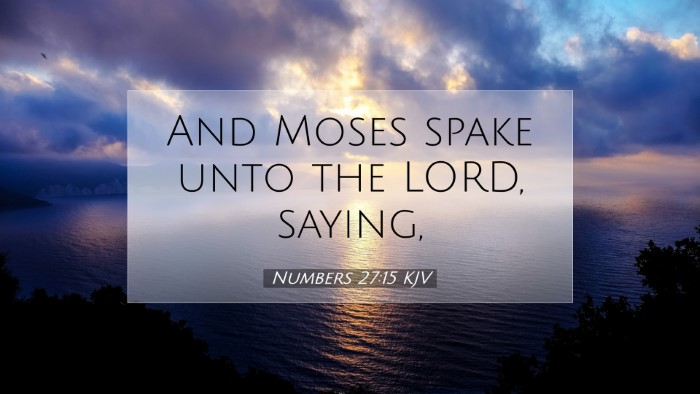Commentary on Numbers 27:15
Text of the Verse: "And Moses spake unto the Lord, saying," (Numbers 27:15, KJV)
Introduction
The verse in Numbers 27:15 serves as a prelude to both a critical moment in Israel’s history and a profound exploration of leadership and divine guidance. It captures the essence of Moses’ intimate relationship with God, showcasing his reliance on divine wisdom, especially when faced with significant transitions in leadership.
The Context of Numbers 27
This chapter takes place at a pivotal point in the wilderness wanderings of Israel. As Moses is preparing to hand over the leadership baton to Joshua, he seeks guidance from God regarding the future of His people. This moment encapsulates the themes of succession, divine providence, and the importance of spiritual leadership.
Moses’ Leadership Role
- Moses as Intercessor: Commentators like Matthew Henry highlight Moses’ role as an intercessor. His approach to God reflects not only his concern for Israel but also his humility and recognition of his limitations as a leader.
- The Weight of Leadership: Albert Barnes emphasizes the burdens of leadership that Moses carried. His plea is a reflection of a leader deeply invested in the well-being of the people he was tasked to lead.
The Nature of Moses’ Prayer
Moses’ communication with God, as presented in this verse, emphasizes directness and sincerity. Adam Clarke notes that Moses did not merely present requests but engaged in dialogue with God, embodying a model for prayer that is relational rather than transactional.
Divine Guidance in Leadership Transition
As Moses transitions leadership responsibilities to Joshua, we see the theme of divine guidance re-emphasized.
- The Importance of Succession: Commentators agree that Moses’ inquiry is essential for the continuity of leadership. The selection of Joshua represents God’s ongoing guidance in times of change.
- Preparing Leaders: Barnes highlights how Moses’ prayer sets an example for future leaders, emphasizing that seeking God’s counsel should be central in leadership transitions.
Theological Implications
This verse invites theological reflection on the character of God as a guide. It reassures believers that God is actively involved in the affairs of His people, particularly in moments of uncertainty.
- God’s Sovereignty: The reliance on divine choice over human wisdom underscores the sovereignty of God in leadership.
- Prayer as a Response to Need: Moses’ action teaches that prayer is essential, especially during challenging times, reinforcing the idea that leaders should not act independently of divine wisdom.
Practical Applications for Today
The insights from Numbers 27:15 hold significant implications for contemporary leaders in the realms of ministry and community.
- Seeking God’s Will: Pastors and leaders are reminded to seek God’s guidance in decision-making processes, especially concerning leadership transitions.
- Encouraging Spiritual Leaders: The importance of prayer and counsel from God is paramount; leaders should foster environments where they can seek divine direction collectively.
- Modeling Dependence on God: By emulating Moses’ reliance on God, leaders can exhibit trust and faithfulness in their ministries.
Conclusion
Numbers 27:15 offers profound insights into the nature of divine guidance and leadership. Moses’ example serves as an enduring model for leaders today, encouraging a posture of humility, dependence on God, and active engagement in prayer. The verse stands as a reminder that true leadership is rooted in an ongoing relationship with the Almighty, who is committed to guiding His people through every transition and challenge they face.


